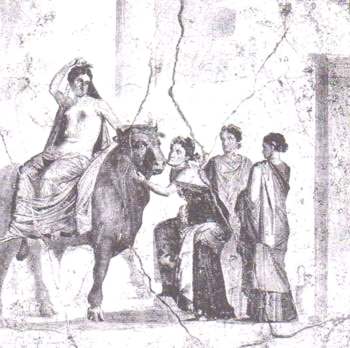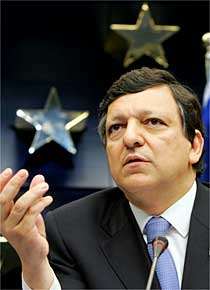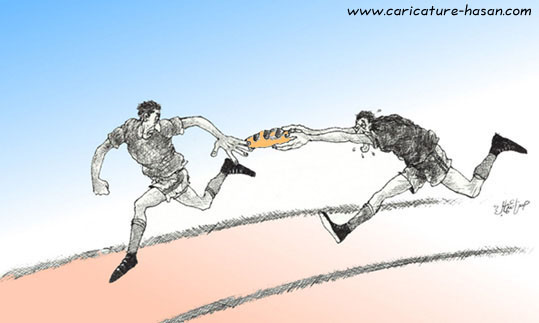
JULY 2004

June 29 (Bloomberg) -- Portuguese Prime Minister Jose Manuel Durao Barroso, named today by European Union leaders as the next head of the EU's executive arm, vowed that big countries won't dictate the makeup of his European Commission.
``It is my responsibility, only my responsibility, to ensure proper distribution of the portfolios,'' Durao Barroso told a news conference in Brussels after being nominated. ``I will shoulder this responsibility myself.''
 He
also promised at a trilingual news conference marked by
flashes of self-deprecating humour to show fairness to
small and large countries alike as head of the EU
executive and shrugged off suggestions he was picked as a
lowest common denominator.
He
also promised at a trilingual news conference marked by
flashes of self-deprecating humour to show fairness to
small and large countries alike as head of the EU
executive and shrugged off suggestions he was picked as a
lowest common denominator.
"It's
true the Iraq question divided Europe," said
Barroso, a 48-year-old conservative lawyer. "It's
important that we concentrate on what unites us."
SINISTER
ADVICE, WILL IT BE APPLIED?
Lawyers advising U.s.President George W.Bush on the
legality of abusing prisoners at Guantanamo Bay in Cuba
have cited an Irish case as justification for the
ill-treatment.The memo cites the 1978 case of Ireland v.
U.K, a decision of the European Court of Human
Rights..... The memo concluded that only acts
"specifically intended to inflict severe pain or
suffering" whether mental or physical were
banned....Interogators are permitted to inflict sever
mental pain which is not intended to have lasting effects
and physical pain which does not cause"serious
physical injury such as death or organ
failure."Sunday
Business Post
FRANCE:
The Right-Wing Politicians are assembling in
brazen attacks against Humanitarian Laws that developed
consistently in Europe during the last fifty years:
Will President Chirac, as final arbiter, block the
extradition to Italy of Cesare Battisti? Battisti, author
of novels depicting the dilemmas facing reformed
extremists (which he is himself), was recently praised
for the best written condemnation there is of the
absolute impasse that is terrorism.
His lawyer, Irene Terrel, said "The three judges
here today delivered the political decision they had been
instructed to deliver. It dishonours our institutions and
the rule of law."President Mitterand had offered
sanctuary to several far left Italian guerillas in 1985
on condition that they renounced their past. His main
supporters, intellectuals, authors and left-wing
politicians, argue that a pledge has been broken. It was
ruled in Court that the French Government "cannot be
bound by political promises made by the French Government
20 years ago."
The right-wing French Government, in the wake of the
Sept.11th 2001 attack in USA is determined to show its
commitment to fighting terror in all its forms and thus
reveals the ignorance of its push to power over the
Socialist reformers, the historical malice of the Right
toward all thinkers and artists, and the craven
collaboration with governments such as the Berlusconi
Government in Italy. The Court order was called a
"Great Victory" and a "strong signal to
all delinquents and terrorists".
Germany:BERLIN, Three men tried to hijack a plane from
Munich to Istanbul carrying 150  passengers
but the pilot was able to return to Munich airport where
special forces stormed the plane, German television
reported this morning. Bayerischer
Rundfunk television reported that police said the pilot
hit an alarm button after the plane, run by the company
Free Bird, had been in the air for 10 minutes.
passengers
but the pilot was able to return to Munich airport where
special forces stormed the plane, German television
reported this morning. Bayerischer
Rundfunk television reported that police said the pilot
hit an alarm button after the plane, run by the company
Free Bird, had been in the air for 10 minutes.
The television said the 150 passengers were unhurt. It said special forces overpowered the three kidnappers and one of them jumped from the plane onto the tarmac. No other details were immediately available. STUFF NEWS. nz.
History ; Book
Review by David Sasha
Maria Rosa Menocal, The Arabic Role in
Medieval Literary History: A
Forgotten Heritage (Second Edition, University of
Pennsylvania Press,
2003, First Published in 1987)
In the earlier part of the 20th century the study of
Sephardic/Andalusian history and culture was a very
important and valued part of Jewish and general
studies. The seminal works of Harry Wolfson and
S.D. Goitein reconstructed a conceptual and historical
Mediterranean universe that was filled with poetry,
philosophy, economic and social advancement, and a great
thirst for applying rational and scientific principles to
the sacred traditions of the great monotheisms of the
Classical period. Wolfson and Goitein produced
important studies of Levantine culture and society
that showed not a static and inert civilization, but a
deeply learned and innovatively dynamic community of
scholars and religious sages who spearheaded the great
luminescence of the Arabic hegemony over knowledge and
culture in the medieval world. Against those
scholars who saw the term "Sephardic" as one
which indicated Hispano-Christian Latinity, Goitein and
Wolfson both well-understood that Sephardic meant, first
and foremost, the Jewish ties to Arab-Levantine
civilization.
The relationship of Arabic civilization and culture to
what was termed the "Dark Ages" in Europe has
been a deeply contentious issue that has served to create
divisions and confusion in the study of
Modern culture and its Renaissance and Enlightenment
antecedents. The question remains, how exactly was
it possible, as scholars have said, that the entire
Greco-Roman patrimony was somehow "lost" for
many centuries and then was "mysteriously"
rediscovered at the time of the great Renaissance of the
14th and 15th centuries. Were there no lines which could
be seen as connecting the Classical world with the
Renaissance of Dante, Petrarch and Cervantes? How is it
that the texts of Plato and Aristotle were missing from
the Europe of the Dark Ages and then somehow all of a
sudden emerge in the age of Aquinas?
Back in the late 1980's, a scholar of medieval Hispanic
culture and literature teaching at the University of
Pennsylvania attempted to provide answers to these
questions in a groundbreaking and seminal work whose
significance and importance has only increased over the
years since its first edition.
The Arabic Role in Medieval Literary History was one of
the first books that I read in my long and arduous
reclamation of my own cultural past. When I first
read the book in 1990 - when it was re-
issued in paperback - the book came to me as a startling
revelation: Menocal had clearly showed, in the wake of
Edward Said's arguments in his study Orientalism, that
Jews and Arabs were written out of history by a Europe
that wished to display its own achievements as being
utterly and completely unique to its own civilization.
The polemic over Western civilization became quite
acrimonious in the years that Said and Menocal were
writing their books. After many centuries of
Western imperialism and political hegemony over the
Eastern world, the very idea that Arabic civilization
could have formed a bedrock platform upon which the
Western culture was scaffolded was an idea that could not
even be entertained. The great achievements of the
massive efforts of the Sephardic Jews and Andalusian
Arabs to translate and transmit humanist culture and
philosophy were elided in favor of a new historical model
which served to erase scholastic giants such as Moses
Maimonides, Averroes, Ibn Hazm and many others who were
associated with the creation of Arabic culture and
civilization in its Golden Age. This polemic was
predicated upon a Eurocentrism that sought to erect false
and misleading barriers between Renaissance and
Enlightenment Europe which was seen as reconstructing the
classical civilization of its Greco-Roman past with nary
an antecedent other than its own grit and
perseverance.
The Arabic Role in Medieval Literary History is a book
constructed along the lines of an argument that is
predicated upon a close reading of POETRY and poetic
influence. Such an argument might
appear esoteric and narrow until we come to realize that
poetry was a lingua franca in the pre-modern world that
corresponded to the popular culture of our own
times. The emergence of an Arabic vernacular poetry
in Spain in the form of the zajal and the muwasshaha
created a popular and populist cachet that served as the
rock and roll of its time (a theme that Menocal would
explore in her Shards of Love, another great study of the
glories of the Sephardic past).
Poetry, intrinsic to the emerging Sephardic/Andalusian
culture, was something that, as Menocal skillfully shows,
paved the way for the Courtly love poetry of the
Renaissance in Europe. Prior to the absorption of
this Arabic poetry, European culture produced an epic
literature along the lines of Beowulf and the Arthurian
canon. The development of the love lyric in the
Troubadour tradition in France and Italy was an outgrowth
of the love poetry that was written in Arab Andalusia:
I believe that we can justify a very different reading of
the narrative of medieval Europe from the eleventh
through the thirteenth centuries. Our reading of
that text would tell us a story rather different from the
one we have grown up with of the role and the fate of the
Arabs who became Europeans at that time but who never
lost their own language or cultural patrimony. We
can understand that a Eurocentric approach to history and
culture would seek to hide this notion of Arabic
influence. The idea that there is a monolithic
Western civilization has been embedded within
our general study and even within the parochial teaching
of Jewish culture and history. Within the Jewish
framework the idea that its traditions and its culture
are uniformly and homogeneously Ashkenazic/European has
been a new and dangerous standard that has served to
eviscerate the very conceptual heart and the intellectual
core of Jewish knowledge in both its scholastic as well
as populist aspects.
The forced repression of the Sephardic/Andalusian model
has had religious repercussions. Modern Judaism has
adopted increasingly more and more obscurantist forms of
behavior be it in its
fundamentalist or its nationalist aspect. This
Ashkenazi-based Judaism is one that has - like its
Western counterpart - closed itself off from a
pluralistic way of seeing its own origins and historical
epistemologies. In the case of modern Judaism the
suppression of the Sephardic paradigm has been a complete
and unmitigated disaster; as Western culture seeks to
open itself to new and multiple ways of seeing and
interpreting its past as that past functions to service
the present, Judaism is now beholden to reductive ways of
dealing with its own history - serving to create
new and often dangerous mentalities that cause fear,
paranoia and an existential hermeticism that has caused
to isolate Jews from the general culture at a time when
that culture has turned expansive and pluralist.
After the publication of The Arabic Role in Medieval
Literary History a number of equally important landmark
studies were published that took on many of the
priorities of the Menocal book: Ammiel Alcalay's After
Jews and Arabs, Ross Brann's The Compunctious Poet, and
Victor
Perera's The Cross and the Pear Tree all re-explored the
richness of the Sephardic past in ways that served to put
that culture on a firm footing for the contemporary
age. The great series of historical novels by the
Arab writer Amin Maalouf on aspects of the Andalusian and
Arab world further provided evidence of this rich and
varied culture. These books were enriched by the
paperback reprinting of Goitein's A Mediterranean Society
in 1999.
As Menocal points out in her new afterword to the book,
1992 saw the publication of a number of new studies that
have illuminated the world of Muslim Spain. The
most important of these, the two-volume anthology of
scholarly essays edited by Salma Khadra Jayyusi called
The Legacy of Muslim Spain has now been complemented by
Menocal's own popular study The Ornament of the World and
the masterful volume of scholarly essays edited by
Michael Sells, Raymond Scheindlin and Ms. Menocal The
Cambridge History of Arabic Literature: The Literature of
Al-Andalus. In addition, we can point to the
wonderful popular study released last year by Richard
Rubenstein Aristotle's Children which bookends Professor
Menocal's Ornament. The latter two books study
the history of Muslim Spain as it relates to the
emergence of the European Renaissance.
This seminal and brilliant book is the first chapter to a
story that Menocal has completed with the publication of
The Ornament of the World. She has told this
epochal story with great fluidity and stylistic grace
backed with a fierce critical and scholarly rigor.
Her writing is a marvel of passion and fiery enthusiasm
that sparks the reader to delve deeper into this
brilliant and dazzling cultural universe where poets and
philosophers were an innate and fundamental part of a
humanistic culture that had not abandoned its traditional
religious past, but served to exalt that past while
blazing new paths in rationalism and scientific inquiry.
For those who seek models of thoughtful spirituality and
enlightened religiosity, the writings of Maria Rosa
Menocal are a beacon in a sea of darkness. Her
sense of what we have repeatedly identified as "The
Levantine Option" has made her in her own right a
seminal figure in the ongoing struggle to reclaim our
Mediterranean past at a time of great strife and
confusion. The Arabic Role in Medieval Literary History
is a landmark of the first order and its republication is
a cause for great joy and celebration. We will
forever be in its debt.
David Shasha©
From togethernet@yahoogroups.com ;
"special affinity"
